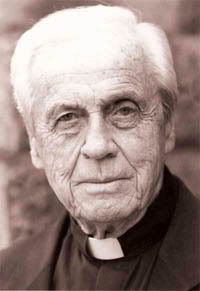 Walter Burghardt, SJ, died Saturday at the age of 95. Though he wouldn’t have remembered, I met Burghardt more than 30 years ago, when I was 19, at a liturgy conference at the University of Notre Dame. As many of you know, and as I was ignorant of at the time, Burghardt was the model of the mystagogical preacher envisioned by the reforms of Vatican II. At an age when most homilists are getting ready to retire to lake homes, Burghardt told me then that he still struggled with every homily and often woke in the middle of the night, stomach churning with nerves, fearful he would not be able to do justice to God’s word and God’s people.
Walter Burghardt, SJ, died Saturday at the age of 95. Though he wouldn’t have remembered, I met Burghardt more than 30 years ago, when I was 19, at a liturgy conference at the University of Notre Dame. As many of you know, and as I was ignorant of at the time, Burghardt was the model of the mystagogical preacher envisioned by the reforms of Vatican II. At an age when most homilists are getting ready to retire to lake homes, Burghardt told me then that he still struggled with every homily and often woke in the middle of the night, stomach churning with nerves, fearful he would not be able to do justice to God’s word and God’s people.
At the sprightly age of 75, Burghardt founded the Just Word project—a retreat and training program designed to energize Catholic preaching, which he once called “dull as dishwater.” Burghardt recognized that the homilist has a responsibility, as Pope Paul VI said in Evangelization in the Modern Word, to take account “of the links between the gospel and the concrete life of men and women. The church considers it highly important to establish structures which are more human, more just, more respectful of the right of the person, less oppressive and coercive” (29, 36).
In a scathing critique of Catholic preaching, Burghardt observed that “all too many Christian preachers either do not believe [this], or believing it, are reluctant or afraid to preach it. The consequence? Encouragement without challenge; biblical sermons bereft of the prophets; a bloodless Jesus who never said, “Blessed are those who are persecuted for justice sake” (Mt 5:10). Ultimately, just a church, a cordial fellowship of believers, not a just church” (The Living Pulpit, October-December 2000, 10).
Burghardt was one of my early inspirations who helped me understand liturgy has the power to change people’s heart and to change the world in which we live. The sadness of his passing is tempered by the great joy of having lived in the company of one of God’s truly faithful servants. May the angels lead him into paradise.

















